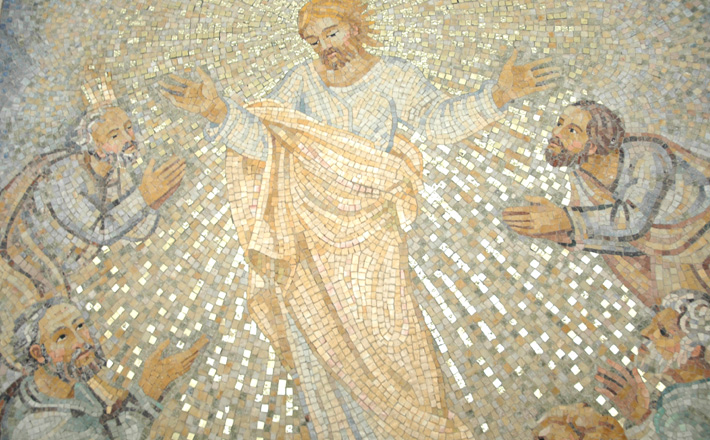Commentary on Matthew 16:24—17:8
In this scene, Jesus is somehow transformed.
Moses and Elijah appear and then strangely disappear. Peter is perplexed. James and John are anonymous. God quotes Godself. Disciples are overcome with awe. Jesus tells them to say nothing!
The scene invites preachers to engage the mysterious and puzzling experience of divine presence, hiddenness, and absence in our own lives.
The previous scene contextualizes this strange one. Jesus has made the startling announcement of his impending crucifixion at the hands of the ruling alliance of Jerusalem leaders and Roman power, and his resurrection (Matthew 16:21). Peter has contested the announcement and Jesus has rebuked him (16:22-23). Jesus has declared that the way of the cross is also for disciples (16:24-25). He then announces he will return to overcome Rome’s empire and establish the empire or kingdom of God (16:27-28).
Immediately, the transfiguration follows. God confirms what Jesus has said. Divine presence accompanies suffering and success, pain and power, trial and triumph, violence and vindication.
The transfiguration unfolds in three movements. The first highlights Jesus’ transformation (Matthew 17:1-4). In the second God speaks (17:5). In the third, the disciples respond (17:6-9). The mountain setting anticipates something significant (compare 4:8; 5:1; 14:23; 15:29-38).
Jesus’ transformation
Jesus’ transfiguration employs two conventional motifs of encounters with and revelations of divine power and presence, namely a shining face and white clothing (Matthew 17:2). Moses descends from Mount Sinai with a shining face (Exodus 34:29). Heavenly beings wear white clothing (see Daniel 7:9; Mark 16:5). And the vindicated righteous will “shine like the sun” (Matthew 13:43) and wear white robes (Revelation 7:9).
Moses and Elijah talk with Jesus. Both encountered God on Mount Sinai and Mount Horeb in circumstances of danger from rulers (Exodus 34, Pharaoh; 1 Kings 19, Ahab). Both were significant figures in revealing God’s will in the law (Moses) and as a prophet (Elijah). Jesus’ link with them emphasizes his similar tasks: to confront Rome’s oppressive rule, reveal God’s will, experience rejection, and experience God’s vindication (16:21).
Peter boldly offers to build three booths (Matthew 17:4). The term “booths” evokes places of divine encounter in the Exodus story: the tent of meeting (Exodus 33:7-10) and the tabernacle for the ark of the covenant (Exodus 40:2, 17-22). The sermon might pursue how we recognize and respond to divine presence.
God talks Peter down
For the second time in the Gospel, previously in Jesus’ baptism (Matthew 3:16-17), God speaks directly. God’s presence is signaled by the “bright cloud,” a common symbol of divine presence (Exodus 19:9; Ezekiel 1:4), The verb “overshadowed” recalls the tent of meeting (Exodus 40:35) and the exodus through the sea (Wisdom 19:7).
God speaks from the cloud and repeats the declaration from Jesus’ baptism (Matthew 3:17). Jesus is God’s son or agent. The term “son” designates Israel (Hosea 11:1), kings (Psalm 2:7, “my son”), and the wise person (Wisdom 2:10-20) as God’s agents chosen to do God’s will. Israel is to be a light to the nations (Isaiah 42:6). Kings are to represent God’s just rule (Psalm 72). The wise person lives according to God’s leading and is opposed by enemies. God declares Jesus to be this agent, this son.
Such a claim imitates and contests. The term “son of God” commonly designated Roman emperors, both the adopted and the natural born. Augustus was the adopted son of the deified Julius Caesar. Other first-century emperors — Tiberius, Nero, Vespasian, Titus, Domitian — were designated sons of gods. The term recognizes their roles as agents of the gods. They embodied exalted status and great power. They imitated the gods and enacted beneficial rule on their behalf. To call Jesus God’s son defines him as having similar roles and sets him in contested and imitative relation to imperial claims.
God again expresses love for Jesus and announces that God has “chosen” him. This is a better translation than “well pleased.” The verb expresses choice in passages such as Psalm 68:16 and 1 Maccabees 10:47; 14:41. Its use here highlights Jesus’ God-chosen identity and destiny, as does the divine plea: “listen to him” (Matthew 17:5).
What has Jesus said?
What is revealed in this revelation of Jesus’ glory? This divine appeal to listen to Jesus confirms, and urges attention to, what Jesus has just announced he must do as God’s agent. In Jerusalem, the Rome-allied Jerusalem elite will kill him. God will raise him (Matthew 16:21).
Moreover, Jesus has announced he will return in glory as the Son of Man to establish God’s empire (Matthew 16:27). He evokes the figure from Daniel 7 to whom God commits everlasting “dominion and glory and kingship, that all peoples, nations, and languages should serve him” (Daniel 7:14). This return, this overwhelming display of divine presence, ends Roman power even as it imitates the imperial paradigm of “power over.” It is imminent: “Some standing here will not taste death before they see…” (Matthew 16:28). The divine appeal to listen to Jesus also confirms Jesus’ saying about the implications of his destiny for disciples. Disciples too are to walk the way of the cross if they are to share in Jesus’ glory (16:24-25).
A sermon might show how this transfiguration passage functions in part as a plot summary in anticipating and sanctioning subsequent events in Jerusalem. It sets out a theological scheme to interpret Jesus’ crucifixion and eschatological return to establish God’s empire. Moreover, it confirms Jesus’ tough teaching for followers. The pressure is on them/us to be faithful in challenging circumstances.
Disciples respond
The three disciples respond by falling to the ground (Matthew 17:6). Others respond similarly to acknowledge divine presence (the magi, 2:11). Their “fear” is a common response to divine presence (compare 1:20; 9:8; 14:27). Jesus provides reassurance, and Moses and Elijah mysteriously disappear (17:8).
Jesus orders the disciples’ silence until after the resurrection (17:9). Is divine presence best — or only — identified in the rear-vision mirror? Disciples must understand Jesus’ multi-faceted destiny and experience the reliability of his resurrection announcement. Then they might know his presence in walking the difficult way of the cross until his triumphant return.
PRAYER OF THE DAY
Radiant God, you revealed yourself in your son, Jesus, when he was transfigured on the mountain before his disciples. Reveal yourself to us daily, so that we might enlighten others with the good news of your love. We pray these things in the name of Jesus Christ, our Savior and Lord. Amen.
HYMNS
Come, follow me, the Savior spake ELW 799
Praise and thanks and adoration ELW 783
Take up your cross, the Savior said ELW 667
CHORAL
Transfiguration, Kathryn Rose


March 3, 2019